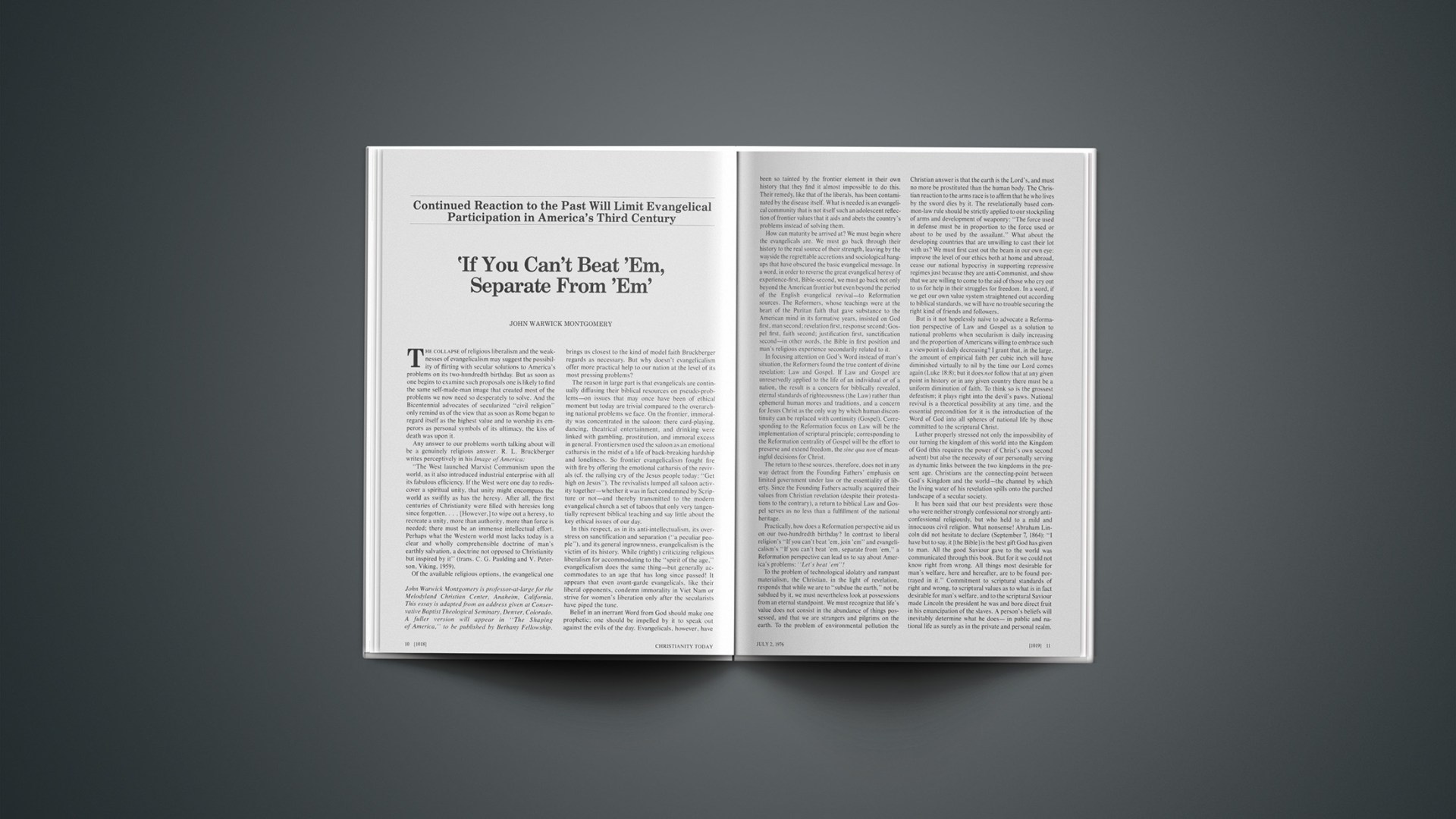The collapse of religious liberalism and the weaknesses of evangelicalism may suggest the possibility of flirting with secular solutions to America’s problems on its two-hundredth birthday. But as soon as one begins to examine such proposals one is likely to find the same self-made-man image that created most of the problems we now need so desperately to solve. And the Bicentennial advocates of secularized “civil religion” only remind us of the view that as soon as Rome began to regard itself as the highest value and to worship its emperors as personal symbols of its ultimacy, the kiss of death was upon it.
Any answer to our problems worth talking about will be a genuinely religious answer. R. L. Bruckberger writes perceptively in his Image of America:
“The West launched Marxist Communism upon the world, as it also introduced industrial enterprise with all its fabulous efficiency. If the West were one day to rediscover a spiritual unity, that unity might encompass the world as swiftly as has the heresy. After all, the first centuries of Christianity were filled with heresies long since forgotten.… [However,] to wipe out a heresy, to recreate a unity, more than authority, more than force is needed; there must be an immense intellectual effort. Perhaps what the Western world most lacks today is a clear and wholly comprehensible doctrine of man’s earthly salvation, a doctrine not opposed to Christianity but inspired by it” (trans. C. G. Paulding and V. Peterson, Viking, 1959).
Of the available religious options, the evangelical one brings us closest to the kind of model faith Bruckberger regards as necessary. But why doesn’t evangelicalism offer more practical help to our nation at the level of its most pressing problems?
The reason in large part is that evangelicals are continually diffusing their biblical resources on pseudo-problems—on issues that may once have been of ethical moment but today are trivial compared to the overarching national problems we face. On the frontier, immorality was concentrated in the saloon: there card-playing, dancing, theatrical entertainment, and drinking were linked with gambling, prostitution, and immoral excess in general. Frontiersmen used the saloon as an emotional catharsis in the midst of a life of back-breaking hardship and loneliness. So frontier evangelicalism fought fire with fire by offering the emotional catharsis of the revivals (cf. the rallying cry of the Jesus people today: “Get high on Jesus”). The revivalists lumped all saloon activity together—whether it was in fact condemned by Scripture or not—and thereby transmitted to the modern evangelical church a set of taboos that only very tangentially represent biblical teaching and say little about the key ethical issues of our day.
In this respect, as in its anti-intellectualism, its overstress on sanctification and separation (“a peculiar people”), and its general ingrownness, evangelicalism is the victim of its history. While (rightly) criticizing religious liberalism for accommodating to the “spirit of the age,” evangelicalism does the same thing—but generally accommodates to an age that has long since passed! It appears that even avant-garde evangelicals, like their liberal opponents, condemn immorality in Viet Nam or strive for women’s liberation only after the secularists have piped the tune.
Belief in an inerrant Word from God should make one prophetic; one should be impelled by it to speak out against the evils of the day. Evangelicals, however, have been so tainted by the frontier element in their own history that they find it almost impossible to do this. Their remedy, like that of the liberals, has been contaminated by the disease itself. What is needed is an evangelical community that is not itself such an adolescent reflection of frontier values that it aids and abets the country’s problems instead of solving them.
How can maturity be arrived at? We must begin where the evangelicals are. We must go back through their history to the real source of their strength, leaving by the wayside the regrettable accretions and sociological hangups that have obscured the basic evangelical message. In a word, in order to reverse the great evangelical heresy of experience-first, Bible-second, we must go back not only beyond the American frontier but even beyond the period of the English evangelical revival—to Reformation sources. The Reformers, whose teachings were at the heart of the Puritan faith that gave substance to the American mind in its formative years, insisted on God first, man second; revelation first, response second; Gospel first, faith second; justification first, sanctification second—in other words, the Bible in first position and man’s religious experience secondarily related to it.
In focusing attention on God’s Word instead of man’s situation, the Reformers found the true content of divine revelation: Law and Gospel. If Law and Gospel are unreservedly applied to the life of an individual or of a nation, the result is a concern for biblically revealed, eternal standards of righteousness (the Law) rather than ephemeral human mores and traditions, and a concern for Jesus Christ as the only way by which human discontinuity can be replaced with continuity (Gospel). Corresponding to the Reformation focus on Law will be the implementation of scriptural principle; corresponding to the Reformation centrality of Gospel will be the effort to preserve and extend freedom, the sine qua non of meaningful decisions for Christ.
The return to these sources, therefore, does not in any way detract from the Founding Fathers’ emphasis on limited government under law or the essentiality of liberty. Since the Founding Fathers actually acquired their values from Christian revelation (despite their protestations to the contrary), a return to biblical Law and Gospel serves as no less than a fulfillment of the national heritage.
Practically, how does a Reformation perspective aid us on our two-hundredth birthday? In contrast to liberal religion’s “If you can’t beat ’em, join ’em” and evangelicalism’s “If you can’t beat ’em, separate from ’em,” a Reformation perspective can lead us to say about America’s problems: “Let’s beat ’em”!
To the problem of technological idolatry and rampant materialism, the Christian, in the light of revelation, responds that while we are to “subdue the earth,” not be subdued by it, we must nevertheless look at possessions from an eternal standpoint. We must recognize that life’s value does not consist in the abundance of things possessed, and that we are strangers and pilgrims on the earth. To the problem of environmental pollution the Christian answer is that the earth is the Lord’s, and must no more be prostituted than the human body. The Christian reaction to the arms race is to affirm that he who lives by the sword dies by it. The revelationally based common-law rule should be strictly applied to our stockpiling of arms and development of weaponry: “The force used in defense must be in proportion to the force used or about to be used by the assailant.” What about the developing countries that are unwilling to cast their lot with us? We must first cast out the beam in our own eye: improve the level of our ethics both at home and abroad, cease our national hypocrisy in supporting repressive regimes just because they are anti-Communist, and show that we are willing to come to the aid of those who cry out to us for help in their struggles for freedom. In a word, if we get our own value system straightened out according to biblical standards, we will have no trouble securing the right kind of friends and followers.
But is it not hopelessly naïve to advocate a Reformation perspective of Law and Gospel as a solution to national problems when secularism is daily increasing and the proportion of Americans willing to embrace such a viewpoint is daily decreasing? I grant that, in the large, the amount of empirical faith per cubic inch will have diminished virtually to nil by the time our Lord comes again (Luke 18:8); but it does not follow that at any given point in history or in any given country there must be a uniform diminution of faith. To think so is the grossest defeatism; it plays right into the devil’s paws. National revival is a theoretical possibility at any time, and the essential precondition for it is the introduction of the Word of God into all spheres of national life by those committed to the scriptural Christ.
Luther properly stressed not only the impossibility of our turning the kingdom of this world into the Kingdom of God (this requires the power of Christ’s own second advent) but also the necessity of our personally serving as dynamic links between the two kingdoms in the present age. Christians are the connecting-point between God’s Kingdom and the world—the channel by which the living water of his revelation spills onto the parched landscape of a secular society.
It has been said that our best presidents were those who were neither strongly confessional nor strongly anticonfessional religiously, but who held to a mild and innocuous civil religion. What nonsense! Abraham Lincoln did not hesitate to declare (September 7, 1864): “I have but to say, it [the Bible] is the best gift God has given to man. All the good Saviour gave to the world was communicated through this book. But for it we could not know right from wrong. All things most desirable for man’s welfare, here and hereafter, are to be found portrayed in it.” Commitment to scriptural standards of right and wrong, to scriptural values as to what is in fact desirable for man’s welfare, and to the scriptural Saviour made Lincoln the president he was and bore direct fruit in his emancipation of the slaves. A person’s beliefs will inevitably determine what he does—in public and national life as surely as in the private and personal realm.
When Christians abrogate their responsibilities in national life, they present engraved invitations to non-Christians to step in and impress their values on the nation. According to John 8, only Christians are “free indeed,” because only they have been emancipated by Christ from debilitating slavery to sin; Christians, therefore, are just the people needed to articulate and put into practice the foundational American ideal of freedom.
What, in sum, is the root problem of American life that the revelationally committed Christian must bend all his efforts to solve? What produces melancholy in our bicentennial American as he faces the third century of his national existence? He fears that “things are out of control”—meaning out of his control—and thereby betrays the self-made-man syndrome that has corrupted so much of his history.
It may therefore be a blessing in disguise that things no longer appear to bend to our control. Perhaps the way is now open to a new era of dependence on the God of Scripture. If so, the proclamation of that wondrous option will depend squarely on the courageous entrance of Christian believers into all spheres of national life.










